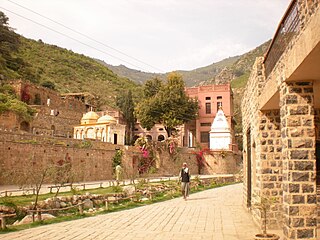Saidpur, Islamabad: Difference between revisions
reverted unconstructive edit |
|||
| Line 46: | Line 46: | ||
}} |
}} |
||
{{Multiple issues|wikify = December 2010}} |
{{Multiple issues|wikify = December 2010}} |
||
'''Saidpur''' is a |
'''Saidpur''' is a 400 to 500 year old Pakistani village built on the slopes of the Margalla Hills. The Village overlooks [[Islamabad, Pakistan]],<ref>http://pakistaniat.com/2008/03/24/siadpur-islamabad-khizer/</ref> and has become a popular tourist attraction for the locals and Foreigners. |
||
==History== |
==History== |
||
Saidpur is named after |
Saidpur is named after Said Khan, one of the sons of [[Sultan Sarang]], the [[Gakhar]] chief of the [[Pothohar]] region (who ruled from Attock to Jehlum) during the reign of the Mughal Emperor [[Babur]]. The Emperor [[Jahangir]]'s memoir, ''Tuzke Jahangiri'', mentions him residing at a place “beyond [[Rawalpindi]]”, on his way to Kabul, which is assumed to be Saidpur. Said Khan gifted Saidpur village to his daughter who was married to son of Mughal emperor [[Akbar]]. |
||
| ⚫ | The village was converted into a place of Hindu worship by a Hindu commander, Raja Man Singh. He constructed a number of small ponds: Rama kunda, Sita kunda, Lakshaman kunda, and Hanuman kunda. The region is home to many Hindu temples that have been preserved; showing the history of Hindu civilisation and architecture in the region. |
||
Said Khan gifted Saidpur village to his daughter who was married to Mughal emperor [[Jahangir]] son of Mughal emperor [[Akbar]]. [[Jahangir]]'s memoir, [[Tuzk-e-Jahangiri]] mentions him residing at a place “beyond [[Rawalpindi]]”, on his way to Kabul, which is believed to be Saidpur. |
|||
==Attractions at SaidPur== |
|||
Saidpur was considered a garden resort and a perpetual spring provided water for drinking and for watering gardens around during the Mughal period. |
|||
| ⚫ | The [[Capital Development Authority]] (CDA) of [[Islamabad]] has developed Saidpur into a tourist attraction by giving it the look and feel of a quaint village. The initial cost of the project was about 400 million rupees.<ref>http://www.opfblog.com/3034/islamabad-another-attraction-added-for-visitors-of-saidpur-village/</ref> |
||
| ⚫ | The village was converted into a place of Hindu worship by a Hindu commander, |
||
== Remodelling of Saidpur == |
|||
In 2006, the [[Capital Development Authority]] initiated the project of remodelling the Saidpur village. The government of France provided technical assistance in remodelling and a leading French architect Max Boisrobert visited the site on the invitation of Ambassador of France Mr Regis de Belenet who assured full cooperation of his country in establishing the recreational spot. |
|||
Max suggested many ideas and techniques to preserve the natural impact of the village during its remodelling. |
|||
| ⚫ | |||
==Tourist Attraction== |
|||
In 2008, the [[Capital Development Authority]] completed the remodelling of Saidpur into a tourist attraction by giving it the look and feel of a quaint village. The key changes that have come about include the re-doing of a temple, the cleaning up of a stream running through the village and giving the mud houses a facelift. Everything in the village reflects the traditional ambience – the temple, the stones used on the walls, the stacks of hay, the horse-drawn carts and all else shows what this Potohar region really was.<ref>http://www.dailytimes.com.pk/default.asp?page=2008\04\10\story_10-4-2008_pg11_1</ref> |
|||
* Old Saidpur School building (it preserves the images of the making of Saidpur, as well as Islamabad) |
* Old Saidpur School building (it preserves the images of the making of Saidpur, as well as Islamabad) |
||
* Restaurants |
* Restaurants |
||
* Cafe's/Art Gallery |
* Cafe's/Art Gallery |
||
* [[Pir (Sufism)|Pir's]] tomb |
* Some [[Pir (Sufism)|Pir's]] tomb |
||
* Restored Hindu Temple & gurdwara |
|||
==See also== |
==See also== |
||
Revision as of 03:53, 3 February 2012
Saidpur | |
|---|---|
 Temple at Saidpur Village | |
| Country | |
| Province | Punjab |
| Elevation | 620 m (2,030 ft) |
| Time zone | UTC+5 (PST) |
This article has multiple issues. Please help improve it or discuss these issues on the talk page. (Learn how and when to remove these messages)
No issues specified. Please specify issues, or remove this template. |
Saidpur is a 400 to 500 year old Pakistani village built on the slopes of the Margalla Hills. The Village overlooks Islamabad, Pakistan,[1] and has become a popular tourist attraction for the locals and Foreigners.
History
Saidpur is named after Said Khan, one of the sons of Sultan Sarang, the Gakhar chief of the Pothohar region (who ruled from Attock to Jehlum) during the reign of the Mughal Emperor Babur. The Emperor Jahangir's memoir, Tuzke Jahangiri, mentions him residing at a place “beyond Rawalpindi”, on his way to Kabul, which is assumed to be Saidpur. Said Khan gifted Saidpur village to his daughter who was married to son of Mughal emperor Akbar.
The village was converted into a place of Hindu worship by a Hindu commander, Raja Man Singh. He constructed a number of small ponds: Rama kunda, Sita kunda, Lakshaman kunda, and Hanuman kunda. The region is home to many Hindu temples that have been preserved; showing the history of Hindu civilisation and architecture in the region.
Attractions at SaidPur
The Capital Development Authority (CDA) of Islamabad has developed Saidpur into a tourist attraction by giving it the look and feel of a quaint village. The initial cost of the project was about 400 million rupees.[2]
- Old Saidpur School building (it preserves the images of the making of Saidpur, as well as Islamabad)
- Restaurants
- Cafe's/Art Gallery
- Some Pir's tomb
See also
Picture gallery
References
Trivia
A funny Ufone advertisement has been filmed in this village. [1]





